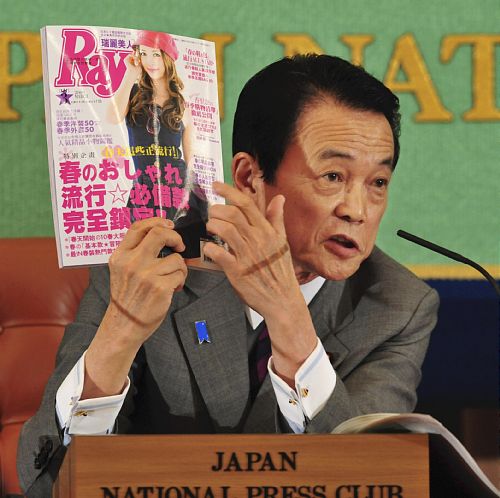Tobias Harris has an article in the Far Eastern Economic Review overviewing the theories for why Japan has a “leadership deficit” which he defines as the current state of affairs in which “The three prime ministers who have followed the dynamic Junichiro Koizumi have shared a degree of tone deafness to the concerns of the Japanese public; have done little to fix the many problems facing Japan, problems compounded by the country’s stunning economic collapse; and have struggled to control their unruly Liberal Democratic Party (LDP).”
He lays out a three-pronged explanation: leadership as he defines it has failed due to “institutional constraints” (gridlock in the PM’s attempts to carry out policy in contention with bureacratic and intraparty LDP interests), “a generational constraint” (lack of good presentation skills), and “the immensity of the problems facing Japan.” He concludes that as an institution, the LDP itself is part of the problem, and, that a change in political leadership (preferably under a “feared” Ozawa who can act decisively) would be a step toward eliminating these barriers, if the DPJ does not become overwhelmed with the task of governing this troubled nation.
As part of his argument, he dismisses as essentially irrelevant the common view that the large number of hereditary politicians is behind Japanese leadership deficiencies:
There is no shortage of theories for why Japan’s politicians are so inept. One popular explanation is that Japan is cursed with hereditary politicians. The argument is that the princelings, having ambled into politics without having to forge close relations with the voters who elect them, have lost touch with the concerns of the average citizen. With roughly a quarter of the members of both houses of the Japanese Diet being representatives by inheritance—and reportedly 40% of LDP members—the idea is that Japanese politicians are a pampered lot, insensitive to the concerns of the people.
But it is unclear how hereditary politicians are any worse than their ancestors or their nonhereditary peers. There is a sense that this argument amounts to “Abe, Aso, and Nakagawa Shoichi, Q.E.D.” Except that lineage is not destiny. After all, Mr. Koizumi, recognized as one of postwar Japan’s most able leaders, is a third-generation politician; his predecessor, Mori Yoshiro, regarded as one of postwar Japan’s worst prime ministers, was not a hereditary Diet member. If Japan has a leadership deficit, its source likely lies elsewhere.
One question I would ask: If inheritance and incumbency are the easiest paths to a stable Diet seat, which in turn has traditionally led to leadership positions for those able to earn enough reelections, then doesn’t the high rate of political dynasties necessarily form an important pillar of the LDP as an institution?
But on the whole I can accept Tobias’s premise. While the widespread and well-established nepotism in Japan in many ways is a serious problem as it crowds out newcomers and entrenches the elite (just as it is elsewhere), I will allow that for the purposes of a more narrow discussion on Japan’s immediate political problems, it might not be the most productive aspect of the debate to focus on. Rather than pushing for internal reform of the longtime incumbent, the knowledge that underperformance will mean getting voted out of power would be the best way to motivate politicians.
Now that Japan’s postwar leadership cabal has failed fairly consistently for the past two decades, people, or at least certain corners of punditry, are less forgiving of practices that were completely acceptable and typical of serious leaders. Hereditary politicians are just the most prominent example of the back-scratching and nepotistic practices of the people in charge.
But while estate taxes in Japan are designed to limit the ability of wealthy citizens to create multigenerational empires, according to Takashi Uesugi loopholes in the estate tax rules allow politicians to pass their policial fund management groups onto relatives without estate taxes. It’s an obvious protection for incumbents that has been left untouched for decades, and I only learned about it the other day. I am not sure of the extent to which this serves to pass on the incumbency advantages (name recognition and blood ties might be even more significant than the initial funding base), but I am surprised not to have seen it before (though that might say more about me than anything else).
****
Check the #0066cc;">Adamukun blog for Adamu’s shared articles and recommended links.



